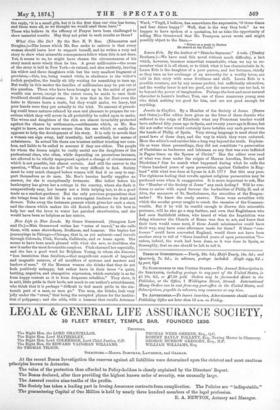What Can She Do? By the Rev. E. P. Roe.
(Edmonston and Douglas.)—The lesson which Mr. Roe seeks to enforce is that every woman should learn how to support hersek and he writes a very sad story to show what miserable consequences follow when this is not done. Yet, it seems to us, he might have chosen the circumstances of his story much more wisely than he has. A great millionaire—the scone of the story is laid in New York—is rained, and dies suddenly, leaving his widow and three daughters with but the very smallest fragment of provision,—this, too, being wasted while, in obedience to the widow's foolish prejudice, the family sit idly waiting for something to turn up. But really in this matter the families of millionaires may be put out of the question. Those who have been brought up in the midst of great wealth can never, except in the rarest cases, be made to earn their livelihood should disaster come. It is true that in the East even the heirs to thrones learn a trade, but they would make, we fancy, but poor hands were they put actually to the trial. No amount of preach- ing could brace natures relaxed by ease and pleasure to prepare for ex- ertions which they will never in all probability be called upon to make. The wives and daughters of the rich are almost invariably protected against the chance by settlements,—settlements which, as Mr. Roe ought to know, are far more secure than the one which so easily dis- appears to help the development of his story. It is only in novels that a woman can sign away, half trustfully, half carelessly, her means of subsistence. In actual life there are trustees neither trusting nor care- less, and liable to be called to account if they are either. The people for whom the lesson might be really useful are the daughters of the professional class, who often, while depending on precarious incomes, are allowed to be wholly unprepared against a change of circumstances which is not possible, but almost certain. And still the answer to the question, "What can she do ?" will be very difficult to find. Society must be very much changed before women will find it as easy to sup- port themselves as do men. Mr. Roe's heroine hardly supplies an answer, for she is exceptionally fortunate. Her father before his bankruptcy has given her a cottage in the country, where she finds it comparatively easy, her beauty not a little helping her, to do a good trade as a market-gardener. But the only previous preparations that she brings from her old life is an extravagant fondness for fruit and flowers. Take away the fortunate present which gives her such a start, and the charm which makes the old Scotch gardener do his best to help her and the lover to water her parched strawberries, and she would have been as helpless as her sisters.


































 Previous page
Previous page